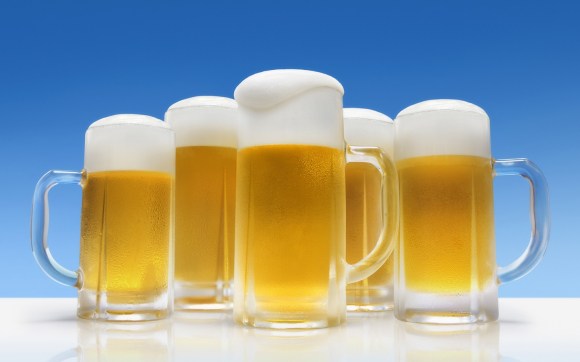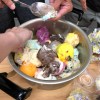
Earlier this week, we talked about the purported beauty benefits of Japanese rice wine. Today, we’ve got good news for health-conscious beer lovers.
One of the recent health trends in Japan is limiting your purine body intake. Just about anything you eat or drink contains purines, which break down into uric acid. While a certain level of uric acid is beneficial to the body, particularly in maintaining the health of blood vessels, having too much in the blood stream results in the condition called hyperuricemia, and can lead to a host of medical problems such as gout, easily one of the most unpleasant old-timey-sounding maladies to be stricken with.
It’s commonly thought that beer is a major purine source, and some staff members at our Japanese sister site have had friends tell them they’re cutting back in an effort to reduce their purine intake. However, one of their acquaintances, a self-proclaimed beer expert, made the bold assertion that compared to other dietary sources, beer actually contains hardly any purine bodies at all.
At first we were skeptical. After all, you don’t become a “beer expert” without spending a considerable amount of time drunk, so could we really trust his testimony? On the other hand, we’d hate to waste even a single valid reason to knock back a cold one, so we decided to check with the experts.
We logged onto the homepage of Japan’s Gout Research Foundation, something we’d never imagined ourselves doing, outside maybe needing an innocent looking website to switch to if someone walks by while we’re browsing naughty websites at the public library. The foundation’s homepage includes a chart with the purine body contents of various foods and beverages, and we took a look at the one for beers.
The purine amounts posted were for serving sizes of 100 milliliters (3.4 ounces) of beer. The very lowest, 3.3 milligrams of purines, was listed cryptically as belonging to “Company A, SD,” which we’re speculating is code for “Asahi Super Dry.” Even the highest, the mysteriously designated “Company E,” had only 6.9 milligrams. With a standard-size can of beer in Japan holding 350 milliliters, that works out to a total of less than 25 milligrams.
Of course, not being nutritionists ourselves, these numbers alone didn’t mean much to us. Sure, 3.3 and 6.9 seem like small numbers at first glance, but take on a more alarming light if they’re being used to measure, say, the number of times you get kicked in the crotch.
▼ For more on the exact method for kicking a guy in the crotch 6.9 times, contact our ex-girlfriends.
In relative terms, could three to six milligrams in 100 milliliters of beer be an incredibly high purine body intake? To check, we clicked on the links for the Gout Research Foundation’s other purine content tables, which revealed that 100 grams of natto, the pungent fermented soybeans that are a Japanese breakfast staple, are loaded with 113 milligrams of purines. An identically-sized serving of beef contains 110.8 milligrams of purine bodies. Chicken liver is positively packed with 312.2 milligrams of the stuff, meaning that if your friend eats 100 grams of the avian organ, you can down over 12 liters of beer and still feel satisfied that you’ve consumed fewer purines.
▼ Assuming you can still feel anything at all at that point, of course
Unfortunately, this still isn’t an excuse to start having three lunch beers a day. Once we expand our discussion beyond just purine body intake, we’re right back where we started, with an uphill battle proving that beer is really a medicinal elixir. Getting buzzed also tends to give you a case of the munchies, and with purine being present in just about all foods, the more you eat in general, the more purines you end up with. So go easy on both the chicken livers and the beer. Not only is being abstemious the healthiest option, you’ll be sober enough to look up what that means in the dictionary, too.
Source: Gout Research Foundation
Top image: RocketNews24
Insert images: Austin Self Defense, Sopris Liquor
[ Read in Japanese ]



 Survey finds that one in five high schoolers don’t know who music legend Masaharu Fukuyama is
Survey finds that one in five high schoolers don’t know who music legend Masaharu Fukuyama is Highest Starbucks in Japan set to open this spring in the Tokyo sky
Highest Starbucks in Japan set to open this spring in the Tokyo sky Saitama is home to the best strawberries in Japan that you’ve probably never even heard of
Saitama is home to the best strawberries in Japan that you’ve probably never even heard of Tokyo Skytree turns pink for the cherry blossom season
Tokyo Skytree turns pink for the cherry blossom season Skyscraper sized Pokémon cards to appear in Tokyo all year long in Tocho projection mapping event
Skyscraper sized Pokémon cards to appear in Tokyo all year long in Tocho projection mapping event Survey finds that one in five high schoolers don’t know who music legend Masaharu Fukuyama is
Survey finds that one in five high schoolers don’t know who music legend Masaharu Fukuyama is Highest Starbucks in Japan set to open this spring in the Tokyo sky
Highest Starbucks in Japan set to open this spring in the Tokyo sky Saitama is home to the best strawberries in Japan that you’ve probably never even heard of
Saitama is home to the best strawberries in Japan that you’ve probably never even heard of Tokyo Skytree turns pink for the cherry blossom season
Tokyo Skytree turns pink for the cherry blossom season Skyscraper sized Pokémon cards to appear in Tokyo all year long in Tocho projection mapping event
Skyscraper sized Pokémon cards to appear in Tokyo all year long in Tocho projection mapping event Top 30 tourist sites in Japan: the most popular sightseeing spots for overseas visitors
Top 30 tourist sites in Japan: the most popular sightseeing spots for overseas visitors Foreign tourists in Japan will get free Shinkansen tickets to promote regional tourism
Foreign tourists in Japan will get free Shinkansen tickets to promote regional tourism We mixed all 31 flavors of Baskin Robbins ice cream and created a Frankenstein dessert【Video】
We mixed all 31 flavors of Baskin Robbins ice cream and created a Frankenstein dessert【Video】 Why Sensoji temple in Asakusa is better at night
Why Sensoji temple in Asakusa is better at night Yakuzen ramen restaurant in Tokyo is very different to a yakuza ramen restaurant
Yakuzen ramen restaurant in Tokyo is very different to a yakuza ramen restaurant The 10 most annoying things foreign tourists do on Japanese trains, according to locals
The 10 most annoying things foreign tourists do on Japanese trains, according to locals Starbucks Japan releases new sakura goods and drinkware for cherry blossom season 2026
Starbucks Japan releases new sakura goods and drinkware for cherry blossom season 2026 Naruto and Converse team up for new line of shinobi sneakers[Photos]
Naruto and Converse team up for new line of shinobi sneakers[Photos] Is Sapporio’s Snow Festival awesome enough to be worth visiting even if you hate the snow? [Pics]
Is Sapporio’s Snow Festival awesome enough to be worth visiting even if you hate the snow? [Pics] Japan has trams that say “sorry” while they ride around town…but why?
Japan has trams that say “sorry” while they ride around town…but why? Sakura Totoro is here to get spring started early with adorable pouches and plushies
Sakura Totoro is here to get spring started early with adorable pouches and plushies Poop is in full bloom at the Unko Museums for cherry blossom season
Poop is in full bloom at the Unko Museums for cherry blossom season Shibuya Station’s Hachiko Gate and Yamanote Line stairway locations change next month
Shibuya Station’s Hachiko Gate and Yamanote Line stairway locations change next month Japan’s new “Cunte” contact lenses aren’t pronounced like you’re probably thinking they are
Japan’s new “Cunte” contact lenses aren’t pronounced like you’re probably thinking they are Japan’s newest Shinkansen has no seats…or passengers [Video]
Japan’s newest Shinkansen has no seats…or passengers [Video] Foreigners accounting for over 80 percent of off-course skiers needing rescue in Japan’s Hokkaido
Foreigners accounting for over 80 percent of off-course skiers needing rescue in Japan’s Hokkaido Super-salty pizza sends six kids to the hospital in Japan, linguistics blamed
Super-salty pizza sends six kids to the hospital in Japan, linguistics blamed Starbucks Japan unveils new sakura Frappuccino for cherry blossom season 2026
Starbucks Japan unveils new sakura Frappuccino for cherry blossom season 2026 Take a trip to Japan’s Dododo Land, the most irritating place on Earth
Take a trip to Japan’s Dododo Land, the most irritating place on Earth Is China’s don’t-go-to-Japan warning affecting the lines at a popular Tokyo gyukatsu restaurant?
Is China’s don’t-go-to-Japan warning affecting the lines at a popular Tokyo gyukatsu restaurant? Survey asks foreign tourists what bothered them in Japan, more than half gave same answer
Survey asks foreign tourists what bothered them in Japan, more than half gave same answer Japan’s human washing machines will go on sale to general public, demos to be held in Tokyo
Japan’s human washing machines will go on sale to general public, demos to be held in Tokyo Starbucks Japan releases new drinkware and goods for Valentine’s Day
Starbucks Japan releases new drinkware and goods for Valentine’s Day We deeply regret going into this tunnel on our walk in the mountains of Japan
We deeply regret going into this tunnel on our walk in the mountains of Japan Studio Ghibli releases Kodama forest spirits from Princess Mononoke to light up your home
Studio Ghibli releases Kodama forest spirits from Princess Mononoke to light up your home Major Japanese hotel chain says reservations via overseas booking sites may not be valid
Major Japanese hotel chain says reservations via overseas booking sites may not be valid Put sesame oil in your coffee? Japanese maker says it’s the best way to start your day【Taste test】
Put sesame oil in your coffee? Japanese maker says it’s the best way to start your day【Taste test】 No more using real katana for tourism activities, Japan’s National Police Agency says
No more using real katana for tourism activities, Japan’s National Police Agency says Top 30 tourist sites in Japan: the most popular sightseeing spots for overseas visitors
Top 30 tourist sites in Japan: the most popular sightseeing spots for overseas visitors Foreign tourists in Japan will get free Shinkansen tickets to promote regional tourism
Foreign tourists in Japan will get free Shinkansen tickets to promote regional tourism We mixed all 31 flavors of Baskin Robbins ice cream and created a Frankenstein dessert【Video】
We mixed all 31 flavors of Baskin Robbins ice cream and created a Frankenstein dessert【Video】 Why Sensoji temple in Asakusa is better at night
Why Sensoji temple in Asakusa is better at night Yakuzen ramen restaurant in Tokyo is very different to a yakuza ramen restaurant
Yakuzen ramen restaurant in Tokyo is very different to a yakuza ramen restaurant Osaka establishes first designated smoking area in Dotonbori canal district to fight “overtourism”
Osaka establishes first designated smoking area in Dotonbori canal district to fight “overtourism” How to make amazing sweet apple pancakes using a rice cooker 【RocketKitchen】
How to make amazing sweet apple pancakes using a rice cooker 【RocketKitchen】 Number of foreign students in Japan hits record high, one country accounts for over 35 percent
Number of foreign students in Japan hits record high, one country accounts for over 35 percent New Japanese KitKat flavour stars Sanrio characters, including Hello Kitty
New Japanese KitKat flavour stars Sanrio characters, including Hello Kitty Starbucks Japan is calling it quits with paper straws
Starbucks Japan is calling it quits with paper straws